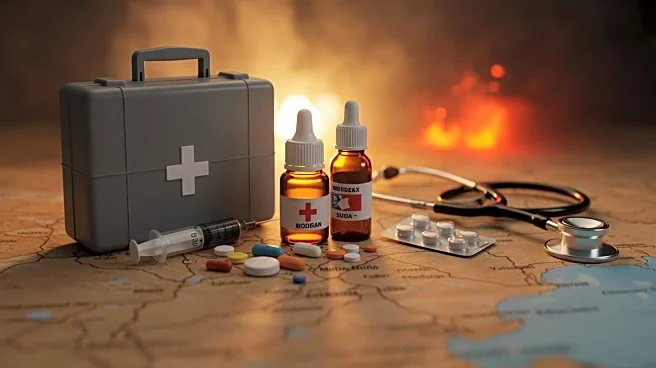What's Happening?
Sudan is currently experiencing its worst cholera outbreak in years, with nearly 100,000 suspected cases and over 2,400 cholera-related deaths reported since the outbreak was declared by the country's Health Ministry a year ago. Médecins Sans Frontières, also known as Doctors Without Borders, has highlighted the dire situation in the town of Tawila, North Darfur, where 40 deaths occurred in just one week. Tawila has become a focal point for the disease due to its proximity to El Fasher, the last holdout of the Sudanese Army in the Darfur region, which has been under siege for over a year. The town's population has swelled with hundreds of thousands of people fleeing violence, leading to overcrowded encampments with inadequate water, health services, and hygiene infrastructure.
Why It's Important?
The cholera outbreak in Sudan is exacerbating the humanitarian crisis in a region already battered by civil war. The lack of clean water and proper sanitation in refugee camps is contributing to the rapid spread of the disease, posing a significant threat to public health. The situation highlights the urgent need for international aid and intervention to prevent further loss of life and to address the underlying issues of water scarcity and inadequate healthcare infrastructure. The outbreak could potentially spread to neighboring regions, increasing the risk of a wider epidemic across Africa.
What's Next?
International charities have warned that if the cholera outbreak is not contained, it could lead to similar outbreaks across the African region for weeks or months. Efforts to provide clean water and improve sanitation in refugee camps are critical to controlling the spread of the disease. The international community may need to increase support and resources to aid organizations working on the ground in Sudan. Additionally, diplomatic efforts to stabilize the region and address the ongoing civil war could help mitigate the humanitarian crisis.
Beyond the Headlines
The cholera outbreak in Sudan underscores the complex interplay between conflict, displacement, and public health. The situation raises ethical questions about the responsibility of the international community to intervene in humanitarian crises and the challenges of providing aid in conflict zones. Long-term solutions to improve infrastructure and healthcare access in Sudan are necessary to prevent future outbreaks and to support the country's recovery from years of war.









